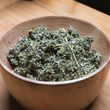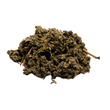

Raspberry Leaves
Regular price $5.99
Unit price per
Raspberry Leaves – Rubus molluccanus
35 g - 100 g - 1 lb
Wild Raspberry plants are common in Northern Saskatchewan in newly disturbed including windfalls and burned areas. Boreal Heartland raspberry leaves are all from wild plants.
Raspberry leaves have many potential health benefits, including:
- Digestive health- Raspberry leaf tea can help with indigestion, bloating, and diarrhea.
- Cardiovascular health - Raspberry leaf contains antioxidants and minerals that may improve blood circulation and regulate blood pressure.
- Premenstrual syndrome (PMS) - Raspberry leaf tea may help relieve PMS symptoms like cramping, nausea, vomiting, and diarrhea.
- Pregnancy - Raspberry leaf tea may strengthen the uterus, improve labor outcomes, and prevent excessive bleeding after childbirth. Some recommend starting to drink raspberry leaf tea at 32 weeks of pregnancy.
- Weight loss - Raspberry leaf tea may help with weight loss by boosting metabolism, getting rid of excess fat, and satisfying sugar cravings.
- Antioxidants - Raspberry leaves contain antioxidants, including tannins, flavonoids, and ellagic acid, which may have anti-cancer properties.
- Mouth ulcers, sore throats, and gum disease - Raspberry leaf tea can be used as a mouthwash to relieve discomfort.
- Inflammatory eye conditions - Raspberry leaf tea can be used as an eyewash for inflammatory eye conditions like conjunctivitis. Raspberry leaf is rich in vitamins and minerals, including vitamins C, E, A, and B, as well as magnesium, potassium, iron, and calcium.
However, raspberry leaf can interact with insulin and medications that slow blood clotting. Taking raspberry leaf with insulin might cause blood sugar levels to be too low, and taking it with medications that slow blood clotting might increase the risk of bruising and bleeding.
Further research into the medicinal uses of Raspberry is needed to better understand definitively the plant’s health benefits. There is not enough scientific information available to guarantee safety for pregnant and breastfeeding women.


